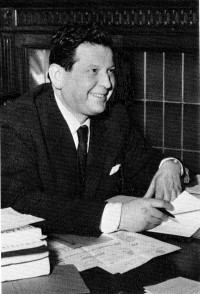Liberty Matters
Bruno Leoni Did Not Fetishize Consent

Both of my previous commentaries raised the issue of how one might evaluate legal and political orders and touched on some implications thereof. In part those commentaries reflect my wondering about how exactly Leoni evaluated those order . That may seem a strange thing to wonder about regarding a libertarian scholar whose best-known work is titled Freedom and the Law. But I don't think the answer is entirely clear.
Here's what I think is clear: Leoni did not fetishize consent. On the contrary, he considered a certain degree of coercion desirable, political coercion, in fact. Leoni said so explicitly—in the same passage where he told us why he rejected anarchism:
I do not say that we ought to do entirely without legislation and give up group decisions and majority rules altogether in order to recover individual freedom of choice in all the fields in which we have lost it. I quite agree that in some cases the issues involved concern everybody and cannot be dealt with by the spontaneous adjustments and mutually compatible choices of individuals. There is no historical evidence that there ever existed an anarchistic state of affairs of the kind that would result if legislation, group decisions, and the coercion of individual choices were to be altogether eliminated.[50]
Leoni's (qualified) endorsement of political coercion appears to be entirely pragmatic. I read it like this: civilization is desirable, and civilization requires some legislation and group decisions, which are coercive; hence some coercion is desirable. Note how at the margin in question—getting society up and running—this prioritizes outcome over process, consequence over consent.
I sense the same prioritization of consequence over consent in Leoni's insistence that the (nonconsensual) "exchange of powers" he sees as originating "political community … is preliminary to any other, of commodities or of services."[51] Given that Leoni thinks highly of markets and considers the political community to some degree coercive, I read: markets are desirable and markets require political community; hence some coercion is desirable. Again, consent is deprioritized at least temporarily in favor of consequence.
And then there's this:
[A] political system based on freedom includes always at least a minimum amount of coercion, not only in the sense of hindering constraint, but also in the sense of determining—for instance, by a majority rule—through a group decision what the group will admit as free and what it will forbid as coercive in all the cases that are not susceptible of an objective determination.[52]
My reading: political order based on freedom is desirable and (ironically) such an order requires some coercion; hence some coercion is desirable.
My point is not that Leoni takes a wealth- or traditionally consequence-centered approach to evaluating legal and political orders. Each of the foregoing examples could be understood in terms of a consent-centered approach that embraces nonconsensual means for the promotion of consensual ends. But even that approach admits that some nonconsensual institutions are desirable—if only to increase the sphere of consensual interaction.
Accordingly, as my previous commentary pointed out, that approach also sees such institutions as necessary evils. And here again I'm left wondering about Leoni: i s that how Leoni saw the nonconsensual institutions he considered desirable? Did he characterize them as necessary evils—or just necessary? I'm not sure.
Endnotes
[50.] Bruno Leoni, Freedom and the Law, expanded 3rd edition, foreword by Arthur Kemp (Indianapolis, IN: Liberty Fund 1991), pp. 129-30. </titles/920#Leoni_0124b_400>.
[51.] Bruno Leoni, Freedom and the Law, pp. 229-30. </titles/920#Leoni_0124b_702>.
[52.] Bruno Leoni, Freedom and the Law, pp. 169-70. </titles/920#Leoni_0124b_544>.
Copyright and Fair Use Statement
“Liberty Matters” is the copyright of Liberty Fund, Inc. This material is put on line to further the educational goals of Liberty Fund, Inc. These essays and responses may be quoted and otherwise used under “fair use” provisions for educational and academic purposes. To reprint these essays in course booklets requires the prior permission of Liberty Fund, Inc. Please contact oll@libertyfund.org if you have any questions.